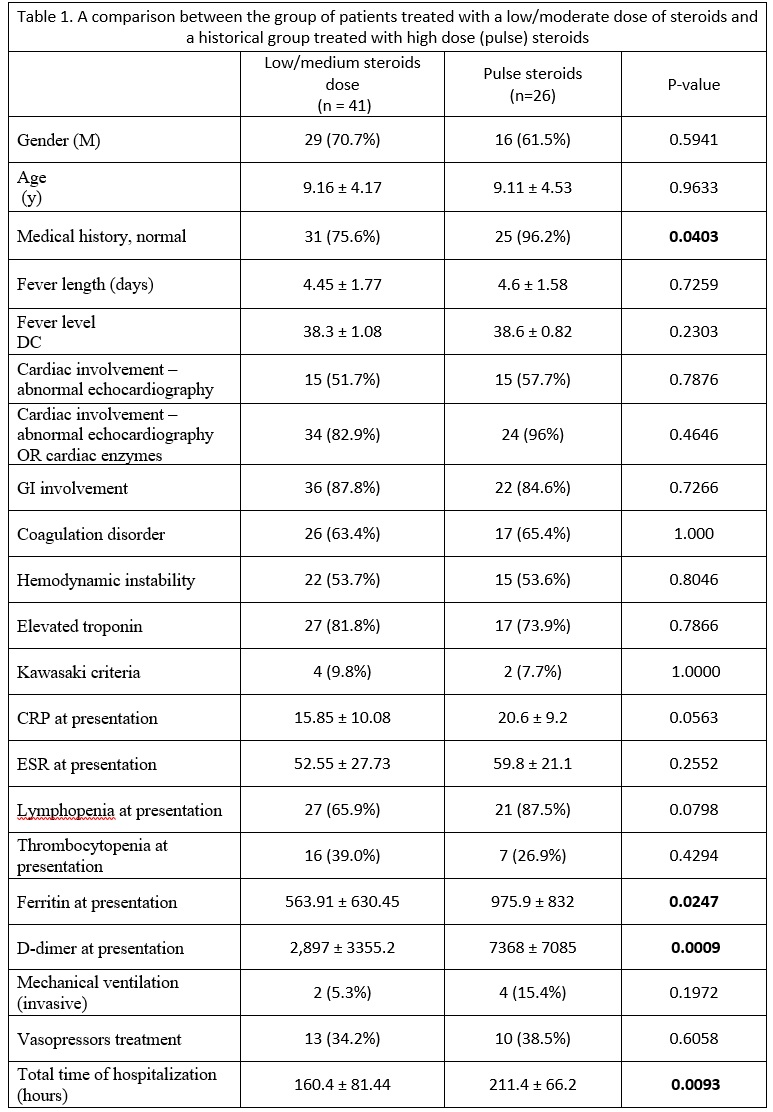Session Information
Session Type: Poster Session B
Session Time: 10:30AM-12:30PM
Background/Purpose: Multisystem Inflammatory Syndrome in Children (MIS-C) is an autoinflammatory disease following SARS-CoV-2 exposure. The optimal treatment strategy remains under investigation, though intravenous immunoglobulin (IVIG) and glucocorticoids are commonly used. While some authors suggest induction with pulse steroids, ACR guidelines recommend initiating low-to-moderate dose glucocorticoids (1-2 mg/kg). This study aimed to assess the response of patients treated with low-to-moderate dose corticosteroids and compare outcomes to a historical cohort treated with pulse steroids.
Methods: A multi-center, retrospective study collected data on patients initially treated with low-to-moderate dose corticosteroids. Clinical and laboratory data were compared to a historical cohort to assess disease severity and outcomes. The primary outcome was treatment escalation after 24 hours. Other outcomes included cardiovascular function, need for adjunctive therapies, and length of hospital stay.
Results: Among 41 patients receiving low-to-moderate dose corticosteroids, 7 (17.1%) required escalation. Overall, 13 (34.2%) needed vasopressors, and 2 (5.3%) required mechanical ventilation. Compared to 26 patients treated with pulse steroids, no differences were found in age, sex, fever characteristics, Kawasaki-like symptoms, or hemodynamic instability. Inflammatory markers (CRP, ESR) were similar, though ferritin was lower in the study group. Hospitalization was longer in the pulse steroid group. An echocardiogram performed post-recovery revealed that 87.5% of the study group had normal cardiac function.
Conclusion: Low-to-moderate dose glucocorticoids are effective for most MIS-C patients, with only 17% requiring escalation. No differences were seen in vasopressor or ventilation needs. Given shorter hospital stays and favorable cardiac outcomes, this approach seems appropriate, although pulse steroids may be considered in severe cases. Further research is needed to optimize dosing and duration of therapy.
To cite this abstract in AMA style:
Shirman N, Harel L, Amarilyo G, Kaidar K, Butbul Aviel Y, Heshin Bekenstein M, Hamad Saied M, Goldzweig O, Miler A, Levinsky Y. Clinical outcomes of low-to-moderate–dose glucocorticoids in multisystem inflammatory syndrome in children (MIS-C) – a multicenter study [abstract]. Arthritis Rheumatol. 2025; 77 (suppl 9). https://acrabstracts.org/abstract/clinical-outcomes-of-low-to-moderate-dose-glucocorticoids-in-multisystem-inflammatory-syndrome-in-children-mis-c-a-multicenter-study/. Accessed .« Back to ACR Convergence 2025
ACR Meeting Abstracts - https://acrabstracts.org/abstract/clinical-outcomes-of-low-to-moderate-dose-glucocorticoids-in-multisystem-inflammatory-syndrome-in-children-mis-c-a-multicenter-study/

